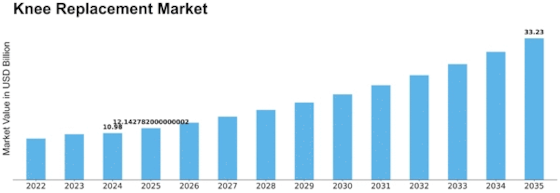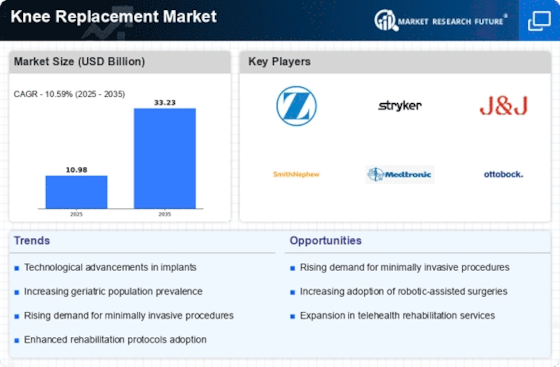Total Knee Replacement
Partial Knee Replacement
Revision Knee Replacement
Metal Alloy
Ceramic
Polyethylene
Cemented
Cementless
Hospitals
Ambulatory Surgical Centers
Specialty Clinics
Under 50
50-65
Above 65
North America
Europe
South America
Asia Pacific
Middle East and Africa
North America Outlook (USD Billion, 2019-2035)
North America Knee Replacement Market by Type of Procedure Type
Total Knee Replacement
Partial Knee Replacement
Revision Knee Replacement
North America Knee Replacement Market by Material Type
Metal Alloy
Ceramic
Polyethylene
Cemented
Cementless
North America Knee Replacement Market by End User Type
Hospitals
Ambulatory Surgical Centers
Specialty Clinics
North America Knee Replacement Market by Age Group Type
Under 50
50-65
Above 65
North America Knee Replacement Market by Regional Type
US
Canada
US Outlook (USD Billion, 2019-2035)
US Knee Replacement Market by Type of Procedure Type
Total Knee Replacement
Partial Knee Replacement
Revision Knee Replacement
US Knee Replacement Market by Material Type
Metal Alloy
Ceramic
Polyethylene
Cemented
Cementless
US Knee Replacement Market by End User Type
Hospitals
Ambulatory Surgical Centers
Specialty Clinics
US Knee Replacement Market by Age Group Type
Under 50
50-65
Above 65
CANADA Outlook (USD Billion, 2019-2035)
CANADA Knee Replacement Market by Type of Procedure Type
Total Knee Replacement
Partial Knee Replacement
Revision Knee Replacement
CANADA Knee Replacement Market by Material Type
Metal Alloy
Ceramic
Polyethylene
Cemented
Cementless
CANADA Knee Replacement Market by End User Type
Hospitals
Ambulatory Surgical Centers
Specialty Clinics
CANADA Knee Replacement Market by Age Group Type
Under 50
50-65
Above 65
Europe Outlook (USD Billion, 2019-2035)
Europe Knee Replacement Market by Type of Procedure Type
Total Knee Replacement
Partial Knee Replacement
Revision Knee Replacement
Europe Knee Replacement Market by Material Type
Metal Alloy
Ceramic
Polyethylene
Cemented
Cementless
Europe Knee Replacement Market by End User Type
Hospitals
Ambulatory Surgical Centers
Specialty Clinics
Europe Knee Replacement Market by Age Group Type
Under 50
50-65
Above 65
Europe Knee Replacement Market by Regional Type
Germany
UK
France
Russia
Italy
Spain
Rest of Europe
GERMANY Outlook (USD Billion, 2019-2035)
GERMANY Knee Replacement Market by Type of Procedure Type
Total Knee Replacement
Partial Knee Replacement
Revision Knee Replacement
GERMANY Knee Replacement Market by Material Type
Metal Alloy
Ceramic
Polyethylene
Cemented
Cementless
GERMANY Knee Replacement Market by End User Type
Hospitals
Ambulatory Surgical Centers
Specialty Clinics
GERMANY Knee Replacement Market by Age Group Type
Under 50
50-65
Above 65
UK Outlook (USD Billion, 2019-2035)
UK Knee Replacement Market by Type of Procedure Type
Total Knee Replacement
Partial Knee Replacement
Revision Knee Replacement
UK Knee Replacement Market by Material Type
Metal Alloy
Ceramic
Polyethylene
Cemented
Cementless
UK Knee Replacement Market by End User Type
Hospitals
Ambulatory Surgical Centers
Specialty Clinics
UK Knee Replacement Market by Age Group Type
Under 50
50-65
Above 65
FRANCE Outlook (USD Billion, 2019-2035)
FRANCE Knee Replacement Market by Type of Procedure Type
Total Knee Replacement
Partial Knee Replacement
Revision Knee Replacement
FRANCE Knee Replacement Market by Material Type
Metal Alloy
Ceramic
Polyethylene
Cemented
Cementless
FRANCE Knee Replacement Market by End User Type
Hospitals
Ambulatory Surgical Centers
Specialty Clinics
FRANCE Knee Replacement Market by Age Group Type
Under 50
50-65
Above 65
RUSSIA Outlook (USD Billion, 2019-2035)
RUSSIA Knee Replacement Market by Type of Procedure Type
Total Knee Replacement
Partial Knee Replacement
Revision Knee Replacement
RUSSIA Knee Replacement Market by Material Type
Metal Alloy
Ceramic
Polyethylene
Cemented
Cementless
RUSSIA Knee Replacement Market by End User Type
Hospitals
Ambulatory Surgical Centers
Specialty Clinics
RUSSIA Knee Replacement Market by Age Group Type
Under 50
50-65
Above 65
ITALY Outlook (USD Billion, 2019-2035)
ITALY Knee Replacement Market by Type of Procedure Type
Total Knee Replacement
Partial Knee Replacement
Revision Knee Replacement
ITALY Knee Replacement Market by Material Type
Metal Alloy
Ceramic
Polyethylene
Cemented
Cementless
ITALY Knee Replacement Market by End User Type
Hospitals
Ambulatory Surgical Centers
Specialty Clinics
ITALY Knee Replacement Market by Age Group Type
Under 50
50-65
Above 65
SPAIN Outlook (USD Billion, 2019-2035)
SPAIN Knee Replacement Market by Type of Procedure Type
Total Knee Replacement
Partial Knee Replacement
Revision Knee Replacement
SPAIN Knee Replacement Market by Material Type
Metal Alloy
Ceramic
Polyethylene
Cemented
Cementless
SPAIN Knee Replacement Market by End User Type
Hospitals
Ambulatory Surgical Centers
Specialty Clinics
SPAIN Knee Replacement Market by Age Group Type
Under 50
50-65
Above 65
REST OF EUROPE Outlook (USD Billion, 2019-2035)
REST OF EUROPE Knee Replacement Market by Type of Procedure Type
Total Knee Replacement
Partial Knee Replacement
Revision Knee Replacement
REST OF EUROPE Knee Replacement Market by Material Type
Metal Alloy
Ceramic
Polyethylene
Cemented
Cementless
REST OF EUROPE Knee Replacement Market by End User Type
Hospitals
Ambulatory Surgical Centers
Specialty Clinics
REST OF EUROPE Knee Replacement Market by Age Group Type
Under 50
50-65
Above 65
APAC Outlook (USD Billion, 2019-2035)
APAC Knee Replacement Market by Type of Procedure Type
Total Knee Replacement
Partial Knee Replacement
Revision Knee Replacement
APAC Knee Replacement Market by Material Type
Metal Alloy
Ceramic
Polyethylene
Cemented
Cementless
APAC Knee Replacement Market by End User Type
Hospitals
Ambulatory Surgical Centers
Specialty Clinics
APAC Knee Replacement Market by Age Group Type
Under 50
50-65
Above 65
APAC Knee Replacement Market by Regional Type
China
India
Japan
South Korea
Malaysia
Thailand
Indonesia
Rest of APAC
CHINA Outlook (USD Billion, 2019-2035)
CHINA Knee Replacement Market by Type of Procedure Type
Total Knee Replacement
Partial Knee Replacement
Revision Knee Replacement
CHINA Knee Replacement Market by Material Type
Metal Alloy
Ceramic
Polyethylene
Cemented
Cementless
CHINA Knee Replacement Market by End User Type
Hospitals
Ambulatory Surgical Centers
Specialty Clinics
CHINA Knee Replacement Market by Age Group Type
Under 50
50-65
Above 65
INDIA Outlook (USD Billion, 2019-2035)
INDIA Knee Replacement Market by Type of Procedure Type
Total Knee Replacement
Partial Knee Replacement
Revision Knee Replacement
INDIA Knee Replacement Market by Material Type
Metal Alloy
Ceramic
Polyethylene
Cemented
Cementless
INDIA Knee Replacement Market by End User Type
Hospitals
Ambulatory Surgical Centers
Specialty Clinics
INDIA Knee Replacement Market by Age Group Type
Under 50
50-65
Above 65
JAPAN Outlook (USD Billion, 2019-2035)
JAPAN Knee Replacement Market by Type of Procedure Type
Total Knee Replacement
Partial Knee Replacement
Revision Knee Replacement
JAPAN Knee Replacement Market by Material Type
Metal Alloy
Ceramic
Polyethylene
Cemented
Cementless
JAPAN Knee Replacement Market by End User Type
Hospitals
Ambulatory Surgical Centers
Specialty Clinics
JAPAN Knee Replacement Market by Age Group Type
Under 50
50-65
Above 65
SOUTH KOREA Outlook (USD Billion, 2019-2035)
SOUTH KOREA Knee Replacement Market by Type of Procedure Type
Total Knee Replacement
Partial Knee Replacement
Revision Knee Replacement
SOUTH KOREA Knee Replacement Market by Material Type
Metal Alloy
Ceramic
Polyethylene
Cemented
Cementless
SOUTH KOREA Knee Replacement Market by End User Type
Hospitals
Ambulatory Surgical Centers
Specialty Clinics
SOUTH KOREA Knee Replacement Market by Age Group Type
Under 50
50-65
Above 65
MALAYSIA Outlook (USD Billion, 2019-2035)
MALAYSIA Knee Replacement Market by Type of Procedure Type
Total Knee Replacement
Partial Knee Replacement
Revision Knee Replacement
MALAYSIA Knee Replacement Market by Material Type
Metal Alloy
Ceramic
Polyethylene
Cemented
Cementless
MALAYSIA Knee Replacement Market by End User Type
Hospitals
Ambulatory Surgical Centers
Specialty Clinics
MALAYSIA Knee Replacement Market by Age Group Type
Under 50
50-65
Above 65
THAILAND Outlook (USD Billion, 2019-2035)
THAILAND Knee Replacement Market by Type of Procedure Type
Total Knee Replacement
Partial Knee Replacement
Revision Knee Replacement
THAILAND Knee Replacement Market by Material Type
Metal Alloy
Ceramic
Polyethylene
Cemented
Cementless
THAILAND Knee Replacement Market by End User Type
Hospitals
Ambulatory Surgical Centers
Specialty Clinics
THAILAND Knee Replacement Market by Age Group Type
Under 50
50-65
Above 65
INDONESIA Outlook (USD Billion, 2019-2035)
INDONESIA Knee Replacement Market by Type of Procedure Type
Total Knee Replacement
Partial Knee Replacement
Revision Knee Replacement
INDONESIA Knee Replacement Market by Material Type
Metal Alloy
Ceramic
Polyethylene
Cemented
Cementless
INDONESIA Knee Replacement Market by End User Type
Hospitals
Ambulatory Surgical Centers
Specialty Clinics
INDONESIA Knee Replacement Market by Age Group Type
Under 50
50-65
Above 65
REST OF APAC Outlook (USD Billion, 2019-2035)
REST OF APAC Knee Replacement Market by Type of Procedure Type
Total Knee Replacement
Partial Knee Replacement
Revision Knee Replacement
REST OF APAC Knee Replacement Market by Material Type
Metal Alloy
Ceramic
Polyethylene
Cemented
Cementless
REST OF APAC Knee Replacement Market by End User Type
Hospitals
Ambulatory Surgical Centers
Specialty Clinics
REST OF APAC Knee Replacement Market by Age Group Type
Under 50
50-65
Above 65
South America Outlook (USD Billion, 2019-2035)
South America Knee Replacement Market by Type of Procedure Type
Total Knee Replacement
Partial Knee Replacement
Revision Knee Replacement
South America Knee Replacement Market by Material Type
Metal Alloy
Ceramic
Polyethylene
Cemented
Cementless
South America Knee Replacement Market by End User Type
Hospitals
Ambulatory Surgical Centers
Specialty Clinics
South America Knee Replacement Market by Age Group Type
Under 50
50-65
Above 65
South America Knee Replacement Market by Regional Type
Brazil
Mexico
Argentina
Rest of South America
BRAZIL Outlook (USD Billion, 2019-2035)
BRAZIL Knee Replacement Market by Type of Procedure Type
Total Knee Replacement
Partial Knee Replacement
Revision Knee Replacement
BRAZIL Knee Replacement Market by Material Type
Metal Alloy
Ceramic
Polyethylene
Cemented
Cementless
BRAZIL Knee Replacement Market by End User Type
Hospitals
Ambulatory Surgical Centers
Specialty Clinics
BRAZIL Knee Replacement Market by Age Group Type
Under 50
50-65
Above 65
MEXICO Outlook (USD Billion, 2019-2035)
MEXICO Knee Replacement Market by Type of Procedure Type
Total Knee Replacement
Partial Knee Replacement
Revision Knee Replacement
MEXICO Knee Replacement Market by Material Type
Metal Alloy
Ceramic
Polyethylene
Cemented
Cementless
MEXICO Knee Replacement Market by End User Type
Hospitals
Ambulatory Surgical Centers
Specialty Clinics
MEXICO Knee Replacement Market by Age Group Type
Under 50
50-65
Above 65
ARGENTINA Outlook (USD Billion, 2019-2035)
ARGENTINA Knee Replacement Market by Type of Procedure Type
Total Knee Replacement
Partial Knee Replacement
Revision Knee Replacement
ARGENTINA Knee Replacement Market by Material Type
Metal Alloy
Ceramic
Polyethylene
Cemented
Cementless
ARGENTINA Knee Replacement Market by End User Type
Hospitals
Ambulatory Surgical Centers
Specialty Clinics
ARGENTINA Knee Replacement Market by Age Group Type
Under 50
50-65
Above 65
REST OF SOUTH AMERICA Outlook (USD Billion, 2019-2035)
REST OF SOUTH AMERICA Knee Replacement Market by Type of Procedure Type
Total Knee Replacement
Partial Knee Replacement
Revision Knee Replacement
REST OF SOUTH AMERICA Knee Replacement Market by Material Type
Metal Alloy
Ceramic
Polyethylene
Cemented
Cementless
REST OF SOUTH AMERICA Knee Replacement Market by End User Type
Hospitals
Ambulatory Surgical Centers
Specialty Clinics
REST OF SOUTH AMERICA Knee Replacement Market by Age Group Type
Under 50
50-65
Above 65
MEA Outlook (USD Billion, 2019-2035)
MEA Knee Replacement Market by Type of Procedure Type
Total Knee Replacement
Partial Knee Replacement
Revision Knee Replacement
MEA Knee Replacement Market by Material Type
Metal Alloy
Ceramic
Polyethylene
Cemented
Cementless
MEA Knee Replacement Market by End User Type
Hospitals
Ambulatory Surgical Centers
Specialty Clinics
MEA Knee Replacement Market by Age Group Type
Under 50
50-65
Above 65
MEA Knee Replacement Market by Regional Type
GCC Countries
South Africa
Rest of MEA
GCC COUNTRIES Outlook (USD Billion, 2019-2035)
GCC COUNTRIES Knee Replacement Market by Type of Procedure Type
Total Knee Replacement
Partial Knee Replacement
Revision Knee Replacement
GCC COUNTRIES Knee Replacement Market by Material Type
Metal Alloy
Ceramic
Polyethylene
Cemented
Cementless
GCC COUNTRIES Knee Replacement Market by End User Type
Hospitals
Ambulatory Surgical Centers
Specialty Clinics
GCC COUNTRIES Knee Replacement Market by Age Group Type
Under 50
50-65
Above 65
SOUTH AFRICA Outlook (USD Billion, 2019-2035)
SOUTH AFRICA Knee Replacement Market by Type of Procedure Type
Total Knee Replacement
Partial Knee Replacement
Revision Knee Replacement
SOUTH AFRICA Knee Replacement Market by Material Type
Metal Alloy
Ceramic
Polyethylene
Cemented
Cementless
SOUTH AFRICA Knee Replacement Market by End User Type
Hospitals
Ambulatory Surgical Centers
Specialty Clinics
SOUTH AFRICA Knee Replacement Market by Age Group Type
Under 50
50-65
Above 65
REST OF MEA Outlook (USD Billion, 2019-2035)
REST OF MEA Knee Replacement Market by Type of Procedure Type
Total Knee Replacement
Partial Knee Replacement
Revision Knee Replacement
REST OF MEA Knee Replacement Market by Material Type
Metal Alloy
Ceramic
Polyethylene
Cemented
Cementless
REST OF MEA Knee Replacement Market by End User Type
Hospitals
Ambulatory Surgical Centers
Specialty Clinics
REST OF MEA Knee Replacement Market by Age Group Type
Under 50
50-65
Above 65



















Leave a Comment